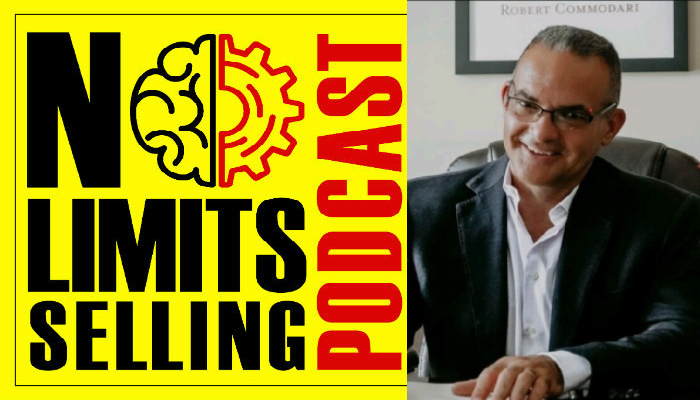Building a Legacy Team In Real Estate by Robert Commodari
On Episode 33 of The No Limits Selling Podcast, we have Robert Commodari, Founder of The Commodari Group. building a legacy team is his goal. Rob has been in business for 15 plus years. Over that time frame, Rob and his team have helped approximately 1300 families fulfill their dream of either buying or selling a home. He specializes in building relationships that last beyond the sale or purchase of your home. Rob takes a personal approach to conduct business as he applies a passionate and sincere interest in helping his clients achieve their goals.
Podcast Highlights:
- If it's worth doing, don't hold back give it your all
- Tenacity is an essential element of success
- Be willing to fail its the only way to grow

Contact Rob:
[EDITOR’S NOTE: This podcast is sponsored by No Limits Selling. It is a fun, fast-paced podcast that delivers hard-fought business advice that you can implement today to improve your sales and performance]
Interested In Our Real Estate Coaching Services? Explore Our Website: Link
Feeling Not Well Today? You Can Use Our Mindset Boosters App To amp Up Your Mood: Link
Find us on Social Media:
LinkedIn | Facebook community | Instagram
Like what do you listen to? Subscribe to our podcast!
Ready to become fearless? We can help you become fearless in 60 days so you accomplish more in your career Schedule A 15 min Call with UmarSummary
Introduction and Background
The podcast begins with host Umar Hameed introducing Robert Commodari, the owner and founder of The Commodari Group. Robert shares his journey from having a tough flight job to delivering newspapers, and eventually entering the real estate industry.
Importance of Education and Self-Development
Robert emphasizes the importance of education in his career, particularly praising the opportunities and education provided by Keller Williams. He also highlights the significance of mindset in real estate and the role of self-development in shaping this mindset. Over the past 28 years, Robert has read about 800 books on self-development, starting with "The Greatest Salesman in the World" by Og Mandino. He continues to read every day, viewing it as a critical part of his personal and professional growth.
Leadership and Overcoming Challenges
Robert discusses his desire to be a better leader and his willingness to step out of his comfort zone to achieve this. He delves into leadership books, systems, and models, and shares them with his team. However, he acknowledges that not all of his attempts to implement new leadership strategies have been successful. He uses these experiences as learning opportunities, assessing the situation and adjusting his approach accordingly.
Building a Legacy Team
Robert's goal is to build a legacy team that will continue to operate even in his absence. He wants to create a well-oiled machine that doesn't stop if he gets sick, hurt, or decides to retire. His biggest fear is that people won't buy into the systems, models, and philosophies he's put in place, which he believes are crucial for the team's success.
Learning from Failures
Robert shares a specific example of how he learns from failures. When he goes on a listing appointment and doesn't get the listing, he calls the potential customer and asks what he could have done better to earn their trust and business. This approach opens him up to humility and provides an opportunity to learn and grow.
Conclusion
In conclusion, the podcast features Robert Commodari, a successful real estate professional and the founder of The Commodari Group, sharing his journey and insights with host Umar Hameed. Robert emphasizes the importance of continuous learning and self-development, as evidenced by his commitment to reading and education. He discusses his leadership style, his willingness to step out of his comfort zone, and his approach to learning from failures. His ultimate goal is to build a legacy team that can operate independently, reflecting his forward-thinking approach and dedication to the success of his team. This podcast offers valuable insights into the mindset and strategies of a successful leader in the real estate industry.
Questions & Answers
Who is Robert Commodari?
What is the focus of Robert Commodari's podcast episode on No Limits Selling?
What is Robert Commodari's approach to self-development?
What is Robert Commodari's leadership style?
What is Robert Commodari's goal for The Commodari Group?
How does Robert Commodari handle failures?
Don’t miss this opportunity to transform your real estate career with one-on-one coaching. As an experienced real estate coach, I, Umar Hameed, am dedicated to helping you unlock your full potential and achieve your real estate goals. To learn more about who am I and my clients ↓
If you’re ready to take the next step, book an appointment with me today and begin your journey toward success in the real estate industry.
